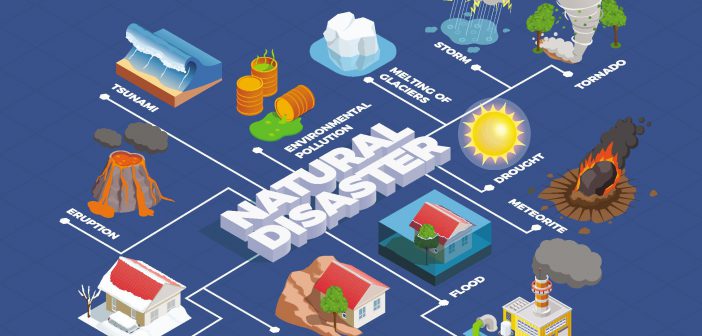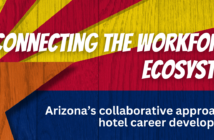Limit liability by planning for the worst, adapting for the best, and responding to the rest
by Taylor Davis
How do you measure the hospitality of your hotel?
Is it the comfort of the rooms? The design of the lobby? The perks you offer?
Many may say that amenities and services are what hotels thrive on, and while the very heart of hospitality is to entertain and receive guests, behind the warmth and helpfulness of your hotel is a foundation of safety.
Your guests expect it, and your hotel can’t survive without it. But are you prepared for a flood, hurricane, or other natural disaster that will wreak havoc on your property? If not, you could be at fault, and your hotel could suffer far beyond the initial threat.
Knowing how to plan for natural disasters not only could save the lives of your guests, but it also can save your property millions of dollars in repairs, damages, and potential lawsuits. It’s up to you to prepare for natural disasters, though, which means having a few key components in place before, during, and after the event to ensure safety, limit liability, and support your guests throughout a terrifying event.
Here are a few ways you can start:
PLAN BEFORE A NATURAL DISASTER
Even though your hotel isn’t liable for every accident of loss that occurs while your guests stay with you, “reasonable care” is expected by law.
“It’s state-specific, but if a natural disaster occurs, failure to properly maintain emergency devices, designate emergency exits, and post emergency procedures can still result in legal liability for negligence for injuries caused by the hotel’s failures and even punitive damages in most cases,” says Taylor Payne, an attorney who primarily practices insurance defense and subrogation in Middle Tennessee with McClellan, Powers, Ehmling & Rogers, P.C.
Planning long before the disaster occurs is key, which includes having:
- Clear emergency evacuation plans to reference, such as exits, critical steps, and points of contact
- A command center with security camera monitoring
- Frequent training once a month or more so your staff is informed
- Expert insurance and safety strategy consultants
- Plans to contact outside resources, such as a PR staff for media communication during and after an event
- Pre-loss risk assessments and insurance coverage reviews
- Communication tools during an event, such as automated email and social media
- Backup systems for online files and backup physical supplies for your guests

GOODVECTOR/SHUTTERSTOCK.COM
“The goal of a good plan should be to eliminate as many variables as possible so that your team is empowered to ‘control the controllable’,” says Arthur Holst, Vice President, Operations Effectiveness & Support, IHG.
One of the key components of that is having a good team to count on.
INFORMED STAFF & CONTINUOUS TRAINING
It’s not enough to practice once or twice a year, especially with employee turnaround.
When disaster strikes your hotel, your staff is the go-to resource for your guests in a time of crisis, which means your employees have to know the plan and how to act in an instant. Confident employees make for safer environments. They’re able to handle tense conditions and control the crowd when your guests look to your employees for direction in crucial safety situations.
Some crucial parts of planning with your team include:
- Seamless Communication
Laying out a chain of command, actionable steps, and easy reference materials that make it clear to your employees who is in charge, who to contact, what to do, and how to respond when one part of the chain is broken gives your hotel the strategies to communicate plans to employees, so your employees can provide accurate safety information to guests and their families.Tips for communication during natural disasters include having a command center and clear points of contact inside and outside the hotel. - Frequent Training
The more you do it, the better your employees get at it, and in doing so, you create a well-oiled machine. Don’t limit it to every quarter or once a year. - Backup Supplies
In an emergency, supplies are critical. Prepare your employees with backup radios, flashlights, batteries, food, water, generators, and other easily reachable supplies.
Prior planning and training give you the advantage to say you did everything you could to prepare your staff, instead of someone saying you weren’t prepared and you should pay for it. Expert planning limits your liability in the event of accident due to an improperly trained employee.
ADAPT DURING A NATURAL DISASTER
It’s not enough to plan. Your staff needs to be calm and be able to respond to the situation even when their training didn’t cover every possible variable. You might be thinking that they’ll have a manual to look through, but that’s not always the case. Reference guides are fantastic to have, but flipping through them won’t help when hurricane winds are bearing down on your hotel and guests are clamoring for your attention.
“The reality is that action plans and disaster-response manuals are only as good as the information that’s digested,” Holst says.
Posting easy-to-read steps for each type of natural disaster in common areas for quick reference may limit some chaos, and help guests and staff have more control.
Take advantage of digital tools, too, using email, text messages, and social media to send critical messages to your guests. You can make this easier by having pre-made templates already created for all platforms that’re quick, customized, and effective, along with one point person to ensure it.
When disaster hits, everything happens fast and there’s a very good possibility that your plans may go up in smoke. But that doesn’t mean your hotel needs to as well.
(Note: It’s also a good idea to pause all social media, email, and ad content that’s not helpful during a disaster.)
RESPOND AFTER A NATURAL DISASTER
Basic natural disaster recovery comes down to keeping track of the damage, guests, and hotel staff to ensure limited liability in most cases. But also having a cleanup plan can limit costs from damages, money lost due to canceled bookings, and, worst of all, trust lost in future bookings.
This also will help you to prepare an insurance claim.
While your hotels may be proactive in planning and adapting to certain situations, corporate support also is crucial to future success. Reaching out to your hotels to understand their needs, changing procedures, and offering support can lessen future liability as well.
The hospitality business is a 365-day-a-year job, and hotels play a pivotal role in natural disaster relief, even if you’re not inside the danger zone. Most hotels are prepared for when it happens but not for the aftershocks, which could be a rush of people turning to your hotel for shelter and safety.

LENABSL/SHUTTERSTOCK.COM
A clear plan and an attitude of service can make or break your hotel, so reaching out to see what your community needs can show your guests that you’re a company they can trust. They’ll want to stay with you in the future, and they will tell their friends.
You can’t plan for everything, but taking every precaution is vital to your hotel’s continued success. There are basic ways you’re obligated to ensure guest and employee safety, from how your hotel is built to the signs you post in the hallways based on legal standards. But limiting your liability goes far beyond a simple insurance contract.
Experts in the hospitality industry agree that having a cross-functional team that can rapidly respond during natural disasters, safety processes and protocols, and flexible policies to adapt for guest needs make it not only easier to prepare and function during a crisis but also lessen accountability and serve as a true standard for the industry. AAHOA.com provides a vast array of disaster preparedness material, including FEMA and other emergency management resources for all 50 states. By taking advantage of what AAHOA has to offer, you can create a plan to empower your team to respond quickly and safely in the event of an emergency.




